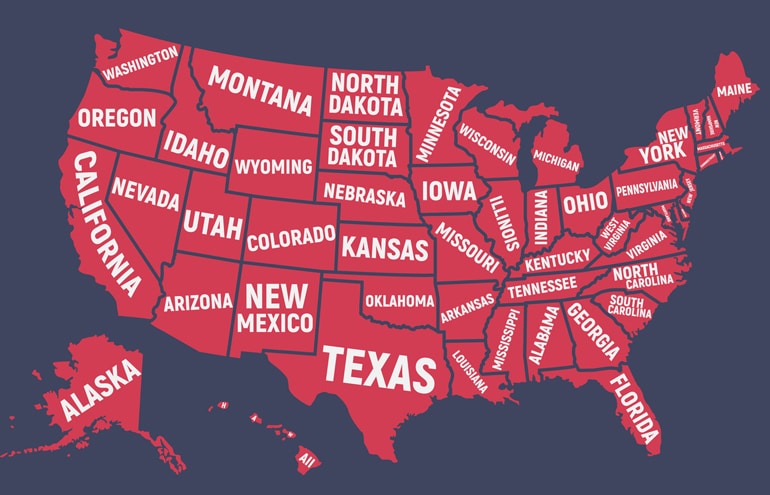“You can go your own way.” I may be dating myself with this reference to the Fleetwood Mac tune from the 1970s, but this is an invitation the states have readily embraced when adopting the rules governing lawyer advertising to prevent false or misleading statements.

Lawyers frequently surprise me with their assurance that they have no concerns because they are in compliance with the American Bar Association’s Model Rules of Professional Conduct. They are ignoring that those model rules are nothing more than suggestions that the ABA encourages states to adopt. And when it comes to the section governing lawyer advertising, I do not believe that any state has adopted the current ABA Model Rules verbatim — and no two states have an identical set of rules. While every state has now adopted the ABA architecture for the rules, they add and subtract specific provisions they believe to be important.
Understanding Lawyer Advertising Rules
Navigating lawyer advertising rules can feel like a daunting task, but it’s essential for maintaining the integrity of your law practice and building trust with prospective clients. Understanding these rules is the first step in creating effective and compliant advertising content. Let’s dive into the history, regulatory bodies, and best practices for using testimonials and endorsements in your law firm’s advertising.
History and Evolution of Legal Advertising
The journey of legal advertising began in earnest in the 1970s, thanks to a landmark Supreme Court decision. In Bates v. State Bar of Arizona (1977), the Court ruled that outright bans on attorney advertising were unconstitutional, citing the First Amendment’s protection of commercial free speech. This decision opened the floodgates for lawyers to advertise their services, but it also necessitated the development of rules to ensure that such advertising remained truthful and respectful.
Over the years, these rules have evolved significantly. Initially, the focus was on preventing false or misleading statements, but as the legal landscape changed, so did the regulations. Today, lawyer advertising rules are designed to ensure that advertisements are not only truthful but also non-misleading and respectful of the legal profession. This evolution reflects a balance between the need for lawyers to market their services and the need to protect the public from deceptive practices.
Regulatory Bodies and Jurisdiction
When it comes to regulating lawyer advertising, the American Bar Association (ABA) plays a pivotal role. The ABA’s Model Rules of Professional Conduct provide a comprehensive framework for lawyer advertising, offering guidelines that state bar associations can adopt and adapt. However, it’s important to note that these model rules are just that—models. Each state has the autonomy appropriate authority to modify these rules to better fit their specific needs and concerns.
State bar associations are the primary enforcers of lawyer advertising rules within their jurisdictions. This means that while the ABA provides a foundational set of guidelines, the specific rules governing lawyer advertising can vary significantly from one state to another. As a result, it’s important for lawyers to familiarize themselves with the rules in their own jurisdiction rules their particular state to ensure full compliance.
State Advertising Rules: Least Restrictive, Most Restrictive and Some Aberrations

While the state rules are not on a true continuum from least to most restrictive, since often the rules are simply different, let’s take a look at some of the provisions of the least restrictive and most restrictive states, as well as some of those straight-up aberrations.
First, we should note that ABA Model Rule 7.1 prohibits communications that are false or misleading. Although not every state agrees on exactly what is a false or misleading statement, this rule is the cornerstone of the regulation of lawyer advertising in every state. Some say the rules do not need to go any further than this prohibition, but no state has yet gone that far.
It is also important to include specific information on a law firm’s website to comply with state advertising rules. This includes featuring lawyer profiles, showcasing their credentials, recognitions, and any relevant qualifications that enhance credibility. Additionally, transparency in advertising content presented on the law firm’s website, including clear information about rates and disclaimers, is crucial to avoid false or misleading communication to potential clients.
However, Virginia and D.C. have stripped out many of the specific provisions that are found in other states.
They do not specifically govern the communication of specializations, and they do not include what I call “housekeeping” rules, discussed below. They both continue to restrict solicitations, although quite differently. Virginia’s rules on solicitation are based on, but not identical to, ABA Model Rule 7.3, while Washington, D.C., adds prohibitions of solicitations around the courthouse and jail.
Other states are considering changes to their rules governing lawyer advertising as part of their regulatory reform initiatives.
These include Arizona, California, Illinois and Utah. Utah proposes stripping out all but the prohibitions of false or misleading communications and interactions involving coercion, duress or harassment. If approved, this would be the least restrictive set of advertising rules among the states.
Next, we have a broad swath of states with rules based on some version of the ABA Model Rules, usually tracking those provisions prior to the ABA’s amendments to the rules in 2018.
For example, an earlier version of the Model Rules required mailed solicitations to those known to need specific legal services in particular field, such as car accident victims, to be labeled as “Attorney Advertising.” The current Model Rules no longer include that provision, but most states still have this labeling obligation.
Additionally, lawyers are allowed to pay for the usual charges reasonable costs associated with a qualified lawyer referral service, as long as they adhere to ethical standards.
Periodic changes to the ABA Model Rules should serve as a reminder for lawyers to check the rules of their states.
States with rules at the more restrictive end of this continuum impose disclaimer requirements, screening obligations, and restrictions on false or misleading statements.
Some disclaimers may apply to all advertisements, while others are contingent on the content of the ads. For example, Alabama Rule 7.2(e) requires all ads to state: “No representation is made that the quality of the full legal service plan or services to be performed is greater than the quality of legal services performed by other lawyers.” From time to time, I hear from firms that their lawyers do, in fact, perform services of greater quality than other lawyers and, therefore, this statement is a violation of the prohibition against misleading advertisements!
These disclaimers help ensure that the communication about a top lawyer or law firm’s services is clear and not misleading, in line with the ABA’s Rules of Professional Conduct.
A few other states require disclaimers when a lawyer advertises contingency fees, uses images of models to stand in for those of lawyers or clients, or otherwise creates a dramatization or simulation concerning a lawyer’s services. Sometimes the exact language of the disclaimer is prescribed. For example, if an Illinois firm advertises that a lawyer is a specialist or expert under some circumstances, the ad must also state that the Supreme Court of Illinois does not recognize certifications of specialties in the practice of law and that the certificate, award or recognition is not a requirement to practice law in Illinois.
Some states require disclaimers to be included on communications concerning a lawyer’s law firm’s website to comply with advertising rules. Currently, Florida, Louisiana, Nevada and Texas require lawyers to submit advertisements for screening under various circumstances. Some of these states include safe harbor provisions precluding the requirement for screening. The rules also exclude types of communications, such as websites. Again, lawyers need to check for the details in their states.
Some states have rules that are simply out of the ordinary, particularly concerning law firm websites.
A few states, such as Arkansas and Missouri, obligate lawyers who send solicitations to do so only through “regular mail” or “U.S. mail.” These rules serve to prohibit offers for legal services sent through email.
Additionally, any reciprocal referral agreement to refer clients must be transparent and prioritize the client’s interests to avoid ethical issues.
Other states include a litany of housekeeping rules that create landmines for lawyers who are not focused on compliance. Some examples, followed by my snarky comments, are as follows:
- In Florida, ads may not be “unduly manipulative.” According to the comments accompanying the rule, showing a car accident is acceptable, but showing one with graphic injuries is not.
- Florida and Pennsylvania prohibit the use of celebrity endorsements. Sorry, Coach Ditka.
- In Indiana, a lawyer may not advertise in a way that appeals primarily to a person’s fear, greed or desire for revenge. No pot of gold at the end of that ad’s rainbow.
- In Missouri, a lawyer may not send a written solicitation that vilifies, denounces or disparages any other potential party. Texans tell me that “bless his heart” is disparaging. So better steer clear of that.
- In New Jersey, advertisements may not depend on absurdity. Television commercials may not include drawings, animations, dramatizations, music or lyrics. Sorry, Charlie Brown.
- Pennsylvania prohibits ads of those who are not lawyers from portraying lawyers in ads. Beware of clip art!
- In South Carolina, an advertisement may only include “a minimal amount of content designed to attract attention to and create interest in the communication.” Explain that to your ad agency.
Advertising Content Guidelines

Key elements to include in compliant advertising content.
When crafting advertising content for your own law firm website, it’s important to hit all the right notes to stay compliant with the American Bar Association’s (ABA) Rules of Professional Conduct. Think of it as a checklist to keep your ads both effective and above board. Here are the essentials:
- Clear and Concise Statement of Services: Make sure your prospective clients know exactly what legal services you offer. No one likes a mystery when it comes to legal help.
- Name and Contact Information: Include the name and contact details of at least one lawyer or the law firm’s responsible for the content. This adds a layer of accountability and trust.
- Physical Office Address: If your state’s bar association requires it, don’t forget to include your physical office address. It’s not just about compliance; it also reassures clients that you have a real, tangible presence.
- Advertisement Statement: Some states require you to clearly state that the communication is an advertisement. It’s like putting a label on a jar—everyone knows what they’re getting.
- State-Specific Requirements: Each state has its quirks. Whether it’s a disclaimer or a statement about the lawyer’s qualifications, make sure you’re ticking all the boxes your state’s bar association requires.
Avoiding misleading or false statements.
Honesty is the best policy, especially in lawyer advertising. Here’s how to keep your content truthful and transparent:
- Avoid Superlatives: Words like “best” or “most successful” can be tempting, but unless you have solid evidence to back these claims, steer clear. It’s better to be modest than misleading.
- No Unsubstantiated Claims: Don’t make promises you can’t keep. If you claim your law firm can achieve certain results, make sure you have the track record to prove it.
- Clear Language: Avoid using language that could confuse or mislead prospective clients. Clarity is key.
- Certification Claims: Only imply specialization or certification if you’ve been officially recognized by a reputable organization. Otherwise, it’s a no-go.
By including these key elements and steering clear of misleading or false statements, you can create advertising content that not only complies with the rules but also effectively promotes your law firm’s services. It’s all about maintaining the integrity of the legal profession while reaching out to those who need your help.
Testimonials and Endorsements in Law Firm Advertising
Testimonials and endorsements can be incredibly powerful tools in your marketing arsenal, but they come with their own set of rules. According to ABA Rule 7.2, using testimonials and endorsements is permissible, but they must be handled with care to avoid misleading prospective clients.
First and foremost, any testimonial or endorsement used in your advertising must be truthful and non-misleading. This means you can’t cherry-pick only the most glowing reviews if they don’t represent the typical experience of your clients. Additionally, you must ensure that clients providing testimonials have given their informed consent and that they are not coerced or compensated for their statements.
Using testimonials effectively involves more than just compliance; it’s about building trust. Make sure the testimonials you use are genuine and reflect the real experiences of your clients. This authenticity will resonate with prospective clients and help build your law firm’s reputation.
Advertising Requirements and Restrictions
Creating effective and compliant advertising content for your law firm involves more than just crafting a compelling message. You must also consider the requirements and restrictions designed to ensure that your advertising is ethical and transparent. Here are some key elements to keep in mind:
- Physical Office Address: Some states, like Florida, mandate that law firms include a physical office address in their advertising materials. This requirement not only ensures compliance but also reassures clients that your firm has a tangible presence.
- Lawyer’s Services: Clearly identify the lawyer or lawyers responsible for the content of your advertisements. This adds a layer of accountability and helps build trust with prospective clients.
- False or Misleading Statements: Avoid making false or misleading statements in your advertising. This includes unsubstantiated claims or superlatives that you can’t back up with solid evidence. Honesty is the best policy here.
- Testimonials and Endorsements: Use testimonials and endorsements in a way that is truthful, non-misleading, and compliant with ABA Rule 7.2. Ensure that clients providing testimonials have given their informed consent and that the testimonials reflect genuine experiences.
- Reciprocal Referral Agreements: If you have reciprocal referral agreements with other professionals, make sure these agreements are transparent, non-exclusive, and prioritize the client’s best interests. This transparency helps maintain the integrity of your practice.
- Law Firm Websites: Ensure that your law firm’s website complies with lawyer advertising rules. This includes providing clear information about the services you offer and identifying the lawyers responsible for the content. Transparency and clarity are key to building trust online.
By adhering to these advertising requirements and restrictions, you can create marketing campaigns that are not for profit but both effective and ethical. This not only helps attract prospective clients but also upholds the integrity of the legal profession.
On a Bright Note
Can’t leave it there, so I’ll finish on a bright note. Sometimes if you dig down far enough, you will come up with something that helps broaden your communications. For example, New York begins its Rules of Professional Conduct with a section on definitions, as do many states. However, unlike other states, New York defines “advertisement.” Within this definition, we see that communications to existing clients or other lawyers do not constitute an advertisement. Therefore these communications do not require compliance with the rules that otherwise impose limits on advertisements.
So, don’t follow the ABA Model Rules; follow the rules of your state. Look for those landmines and tread carefully. Take the time to drill down and look for the exceptions that can make your advertising more effective.
Illustration ©iStockPhoto.com
Subscribe to Attorney at Work
Get really good ideas every day for your law practice: Subscribe to the Daily Dispatch (it’s free). Follow us on Twitter @attnyatwork.
















